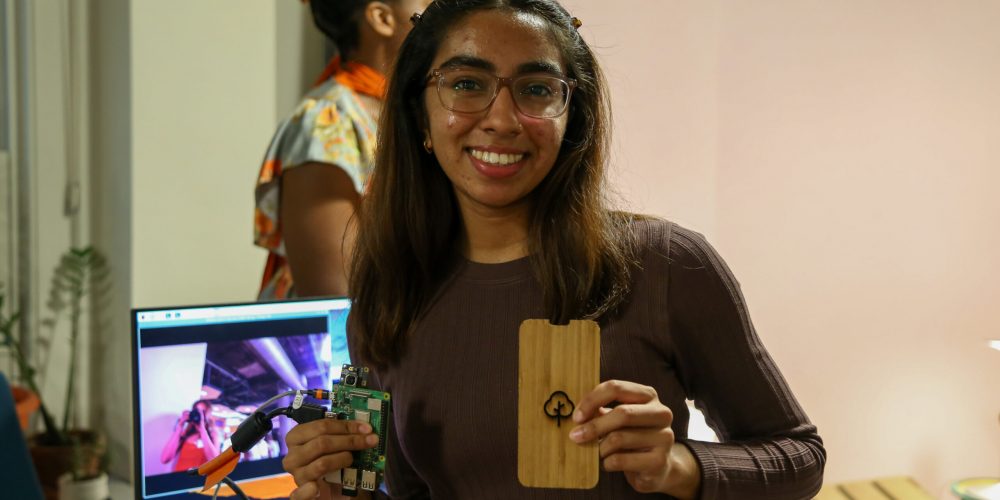by Sabrina Khaleque
There are more phones in the world than there are people, and in 2022, an estimated 5.3 billion of these devices became waste. Asma Ansari ’25, an electrical and computer engineering student at Cornell, aims to address this problem with her startup, Orgophone.
Orgophone’s mission is to make the most sustainably and ethically produced electronics in the United States, offering long-lasting cell phones and devices made from recycled electronic components.
Such an idea deviates from the norm of Big Tech by reducing electronic waste (e-waste) and pushing for modularity. Orgophone’s modular business plan has a website where customers will be able to purchase individual cellphone parts that are prone to breaking, like screens. This would allow them to repair these parts themselves rather than having to buy a whole new device.
“I was always really interested in the idea of sustainability with personal electronics,” Ansari said. “When it comes down to sustainability, the big players are greenwashing, which I already knew of. And the sustainable smartphones that I knew of just weren’t fitting the needs and the standards I had set…So I said, okay, I’ll do it myself!”
Becoming a student entrepreneur was not an easy journey for Ansari, however, as she had to overcome fear stemming from the enormity of her idea.
“I was really intimidated by my own idea,” she said. “I wouldn’t say that I’m not a confident person, but I think when it came to this space, it was so new for me that I just felt so intimidated by everything.”
To bring her idea to life, Ansari sought out opportunities within the Cornell and Ithaca communities, such as the Prototyping Hardware Accelerator. Supported by Cornell Engineering and administered by Rev: Ithaca Startup Works, the 10-week program helps startups advance their ideas for hardware products. As a participant in the accelerator’s ClimateTech track this summer, Ansari focused on business plan development, market research, and prototyping.
“We had staff members who were there to help us with any debunking, hardware stuff, prototyping,” Ansari said about the program’s resources. “We were also able to work with the marketing team at Rev and were allowed to ask them for help with marketing projects.”
Nancy Almann, the co-managing director of Cornell’s Blackstone LaunchPad program, also provided Ansari with valuable mentorship. Blackstone LaunchPad offers mentorship and venture creation support for Cornell students, alumni, faculty, and staff at any stage of their entrepreneurial journey. Whether someone has an idea or needs help with startup challenges, the mentors are readily accessible.
“I met up with Nancy, and I told her about my idea,” Ansari said. “She was the one who actually pushed me to apply for Rev: Ithaca’s Hardware Prototyping Accelerator Program, and well, the rest is history.”
Ansari said a lot of supportive people have encouraged her to actualize her vision for Orgophone, but at the same time, she has been told that her idea is an “ambitious project.” The initial stages of development have already proven to be quite difficult, and hearing doubts from other people about the feasibility of the project only exacerbated those internal doubts.
Ansari’s idea feels large to her because of the magnitude of the problem she aims to tackle— according to the United Nations Environment Programme, global e-waste production could reach 120 million tonnes per year by 2050 if current trends continue. Hence, Ansari’s startup challenges an entire industry that has heavily normalized the spread of harmful electronic waste, which holds precious raw materials and contributes to toxic chemicals in landfills.
Even though roadblocks hindered Ansari’s confidence momentarily, she pushed through thanks to her passion for her fundamental goal: increasing sustainability in the tech industry. She believes that she does not need to figure out everything about her startup at once but can instead let it grow organically. Additionally, whatever she cannot figure out herself, she can resolve through teamwork.
Currently, Ansari’s focus is growing her team. Sipara Sahilu ’25, an information science and environment & sustainability double major, serves as Ansari’s non-technical business partner and is in charge of promotion and marketing tasks. Such support has helped Ansari manage her numerous priorities.
Not only is Ansari balancing school and her startup, but she is also growing her engineering knowledge and technical skills with the help of resources at Cornell. She is the lead of prediction algorithm for the Cornell University Sustainable Design (CUSD) currents project team and is also seeking research opportunities with professors in the electrical and computer engineering department. Ansari said her professors have always been open to helping outside of the classroom.
“What we wanted was to be disruptive in the industry,” Ansari said. “There are already several companies that work on the problem of e-waste, but there aren’t that many companies that work on the actual production of these consumer products in a way that is truly ethical and truly sustainable.”
Supported by a grant from the President’s Council of Cornell Women (PCCW), this story is part of a series focused on celebrating and encouraging Cornell women and non-binary individuals in entrepreneurship.






